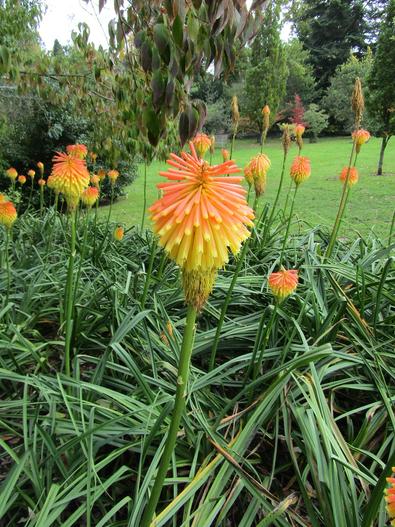Rooper’s Red Hot Poker
(Kniphofia rooperi)
Rooper’s Red Hot Poker (Kniphofia rooperi)
/
/

Leonora (Ellie) Enking
CC BY-SA 2.0
Image By:
Leonora (Ellie) Enking
Recorded By:
Copyright:
CC BY-SA 2.0
Copyright Notice:
Photo by: Leonora (Ellie) Enking | License Type: CC BY-SA 2.0 | License URL: https://creativecommons.org/licenses/by-sa/2.0/ | Uploader: wallygrom | Publisher: Flickr























Estimated Native Range
Summary
Kniphofia rooperi, commonly known as Rooper’s Red Hot Poker, is an evergreen perennial plant native to South Africa, particularly thriving in grasslands and open areas in the Eastern Cape. It grows to a height of 1.2 m (3.9 ft) and features robust, strap-shaped leaves that emerge at an angle from the main stem. The flower spikes are particularly striking, with buds that start green and open to a bright red, fading to yellow and brown, resembling a red-hot poker. This species blooms in the late summer to autumn, providing a vibrant display when many other plants have finished flowering.
Rooper’s Red Hot Poker is celebrated for its bold, architectural form and its ability to add color to the garden late in the season. It is well-suited for mixed flower borders, urban landscapes, and naturalistic plantings, offering a striking contrast to other plants. It is also a valuable source of nectar for hummingbirds and bees. While it is hardy down to −15 °C (5 °F), it requires protection from severe winter wetness. In cultivation, it thrives in full sun and needs consistently moist but well-drained soil to prevent crown rot and ensure the formation of flowerheads. The evergreen foliage may require some tidying in winter to maintain its appearance. Kniphofia rooperi has been recognized with the Royal Horticultural Society’s Award of Garden Merit, indicating its exceptional qualities for garden use. However, gardeners should be aware that in some climates, it may not be fully hardy and could require winter protection.CC BY-SA 4.0
Rooper’s Red Hot Poker is celebrated for its bold, architectural form and its ability to add color to the garden late in the season. It is well-suited for mixed flower borders, urban landscapes, and naturalistic plantings, offering a striking contrast to other plants. It is also a valuable source of nectar for hummingbirds and bees. While it is hardy down to −15 °C (5 °F), it requires protection from severe winter wetness. In cultivation, it thrives in full sun and needs consistently moist but well-drained soil to prevent crown rot and ensure the formation of flowerheads. The evergreen foliage may require some tidying in winter to maintain its appearance. Kniphofia rooperi has been recognized with the Royal Horticultural Society’s Award of Garden Merit, indicating its exceptional qualities for garden use. However, gardeners should be aware that in some climates, it may not be fully hardy and could require winter protection.CC BY-SA 4.0
Plant Description
- Plant Type: Herb
- Height: 3-4 feet
- Width: 3-4 feet
- Growth Rate: Moderate
- Flower Color: Yellow, Red, Orange
- Flowering Season: Fall, Winter
- Leaf Retention: Evergreen
Growth Requirements
- Sun: Full Sun
- Water: Medium
- Drainage: Medium, Fast
Common Uses
Bee Garden, Bird Garden, Butterfly Garden, Drought Tolerant, Fire Resistant, Hummingbird Garden, Low Maintenance, Rabbit Resistant, Rock Garden, Salt Tolerant, Showy Flowers
Natural Habitat
Native to grasslands and open areas in the Eastern Cape of South Africa
Other Names
Common Names:
Scientific Names: , Kniphofia rooperi, Tritoma rooperi, Kniphofia longicollis, Tritoma uvaria var. rooperi,
GBIF Accepted Name: Kniphofia rooperi (T.Moore) Lem.